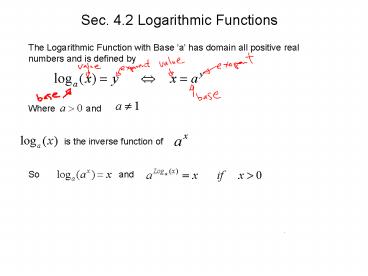Sec' 4'2 Logarithmic Functions - PowerPoint PPT Presentation
1 / 11
Title:
Sec' 4'2 Logarithmic Functions
Description:
4.2 Logarithmic Functions. The Logarithmic Function with Base a' has domain all positive real numbers and is defined by ... Find the inverse Function. ... – PowerPoint PPT presentation
Number of Views:75
Avg rating:3.0/5.0
Title: Sec' 4'2 Logarithmic Functions
1
- Sec. 4.2 Logarithmic Functions
The Logarithmic Function with Base a has domain
all positive real numbers and is defined
by Where and is the
inverse function of So
and
2
Logarithmic Form vs. Exponential Form
3
Properties of Log Functions
4
Graphs of Log Functions
5
Word Problems involving Logs There are many
situations which involve exponential growth.
Interest Rate Problems, Population Growth,
Radioactive Decay, Newtons Law of Cooling,
Absorption of Light, Atmospheric Pressure. If the
function giving Population in terms of time
involves an exponential function, then the
inverse function giving the time when the
Population is a certain value will involve a log
function. To solve an equation with the variable
in the exponent, will require that we take the
logarithms of both sides (at some point). Just
like, to solve an equation where the variable is
squared, requires that we take square roots of
both sides at some point.
6
Word Problems involving Logs The time it takes
for a investment of 3000 to reach a value of A
dollars when it is compounded continuously at 8
annual interest is given by
When will the account be worth 6000. When will
it be worth 1,000,000?
7
Word Problems involving Logs The time it takes
for a investment of 3000 to reach a value of A
dollars when it is compounded quarterly at 8
annual interest is given by
What will the investment be worth in 10 years?
8
Word Problems involving Logs The time it takes
for a investment of 3000 to reach a value of A
dollars when it is compounded quarterly at 8
annual interest is given by
Find the inverse Function. That is the function
that gives the amount of the investment in terms
of time. The algebra is the same as in the
previous problem.
9
Word Problems involving Logs The age of an
artifact can be determined by the amount of
radioactive Carbon-14 remaining in it. If D0 is
the original amount of Carbon-14 and D is the
amount remaining, then the age t in years is
given by
Find the age on an object if 73 of the original
carbon-14 remains.
10
Word Problems involving Logs The age of an
artifact can be determined by the amount of
radioactive Carbon-14 remaining in it. If D0 is
the original amount of Carbon-14 and D is the
amount remaining, then the age t in years is
given by
What percentage of the original carbon-14 remains
after 1000 years?
11
Word Problems involving Logs The age of an
artifact can be determined by the amount of
radioactive Carbon-14 remaining in it. If D0 is
the original amount of Carbon-14 and D is the
amount remaining, then the age t in years is
given by
Find the inverse function. That is solve the
equation above for D in terms of t.

